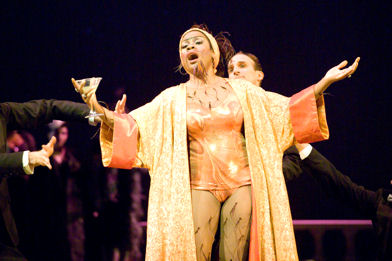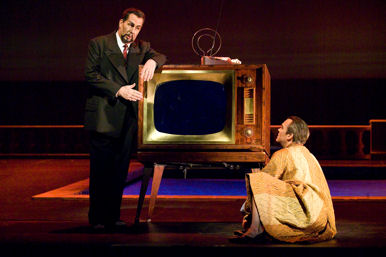Other Links
Editorial Board
- Editor - Bill Kenny
- London Editor-Melanie Eskenazi
- Founder - Len Mullenger
Google Site Search
SEEN
AND HEARD INTERNATIONAL OPERA REVIEW
Stravinsky, The
Rake’s Progress (A second look):
San Francisco Opera; Donald Runnicles, conductor; War Memorial
Opera House, San Francisco. 4.12.2007 (HS)
Resetting any opera in a different time period is always a
double-edged sword. For every dash of insight the change of
scenery delivers, there is the danger of running afoul of specific
references in the libretto.
James Morris is Nick Shadow, this opera's allusion to Faust's
Mephistopheles, and he creates a particularly oily portrait.
Literally. He emerges in the first scene, after Burden and Aikin's
opening duet, from a trap door under the oil well, covered in
shiny black. If his bass baritone has sounded purer, the nasty
edge he gets with the bark developing in his voice lends credence
to the character.
Harvey Steiman
Cast: Tom Rakewell: William Burden; Anne Trulove: Laura Aikin;
Trulove: Kevin Langan; Nick Shadow: James Morris; Mother Goose:
Catherine Cook; Baba the Turk: Denyce Graves; Sellem: Steven Cole;
Keeper of the Madhouse: William Pickersgill
Production: Director – Robert Lepage and Sybille Wilson; Set
Designer – Carl Fillion

Denyce Graves as Baba the Turk
In San Francisco Opera's new Rake's Progress, director
Robert Lepage eschews 18th century England for 1950s America
(except for an incongruous scene in London), quoting images from
movies and dazzling us with imaginative stagecraft. If you don't
think too long about it, the update works brilliantly. In the end,
the clever touches outnumber the hurdles, and the music soars with
virile conducting of Stravinsky's neo-classic score by Donald
Runnicles and a superbly paced and beautifully sung portrayal by
William Burden in the title role.
To open the opera, instead of a bucolic English countryside scene
we get west Texas. A single oil well punctuates a bare stage. A
rear projection displays a cloud-strewn Texas sky. Tom Rakewell
and Anne Trulove share a picnic blanket, recalling an iconic image
from "Giant," remembered as James Dean's last film. The
associations here are strong. Both "Giant" and Rake's Progress
are products of the 1950s. Jett, Dean's character in "Giant," is a
handsome rake much like Tom in the opera, and Ann is an innocent,
like the girl in the image. But when the libretto goes on about
Tom going to London, the tone arm scrapes across the record.
London is a long way from west Texas.
In scene after scene, Lepage gives us images that make us smile at
their aptness, only to bump into problems with the libretto. The
biggest problem is the language itself. The florid 18th century
cadences used by librettists W.H. Auden and Chester Kallman don't
fall easily from the mouths of 1950s Texans.
Another nagging detail is the machine that Tom is fooled into
thinking can turn stones into bread. Here it is a television,
complete with rabbit ears. That's a nice tie to Lepage's theme
that Tom has been seduced by Hollywood (instead of the fleshy
delights of the louche side of London), but it beggars the
imagination that even a lightweight mind like Tom's could believe
that a television could produce a real-life loaf of Wonder Bread.
Some moments of stagecraft wizardry elicit applause from a
delighted audience. Light projections, for example, make that
swimming pool shimmer on its surface. Human beings actually enter
the pool and appear to be in the water, thanks to a gap behind the
front edge that cannot be seen from the audience. An extra does a
swan dive into it at one point. In Mother Goose's brothel, as Tom
is introduced to the free life by coupling with the madam, they
are swallowed up by her heart-shaped bed, disappearing along with
the deep red covers. That fits. Tom is sucked into a new life, and
it's no mistake that the direction they go is down.
From the first scene, Burden creates a realistic portrait of a
young man skating along on his looks and charm, naïve enough for
Nick Shadow to seduce him into a wasted life yet somewhere, deep
inside, he still has an innocent core. His pure lyric tenor seems
made for this music. Laura Aikin sings sweetly and sincerely as
Anne, and is especially affecting in the final scene, but lacks
the cream in her voice to make as much of the music as other
sopranos have.

James Morris (Nick Shadow) and William Burden (Tom)
In Lepage's version of the story, Shadow is a movie mogul. He is
seen directing the Mother Goose scene (set in a bar that tilts up
from the stage) from a camera mounted on a crane. In another
scene, he comes to Tom from behind his trailer, which emerges from
the stage and inflates into a full-size Airstream, complete with
hookup that pops out at one end, eliciting laughs and more
applause.
In the original version, we meet Baba the Turk outside Tom's house
in London. She remains inside a carriage while Anne confronts Tom.
Lepage sets this scene against a movie theater, the marquee
announcing "Tom Rakewell and Baba the Turk in a Nick Shadow film."
London bobbies hold back a crowd. Mezzo soprano Denyce Graves
portrays Baba, singing the music with appropriate abandon and
looking fine in the next scene, lounging by the pool with Tom in a
tangerine-colored bathing suit. She is dragged from the pool later
in the scene where Tom's and Baba's possessions are auctioned, Tom
having lost all his money in the bread/stone/TV boondoggle, and
resumes the rant that was interrupted in mid-phrase. But the joke
loses something because she is not present, under a cover, through
the scene as she is in the original.
In the next scene, Tom follows Nick to a graveyard (here festooned
with relics of gambling signage, i.e., a gambler's graveyard),
where Shadow informs him that he must pay up with his soul. In a
nice self-reference to Stravinsky's "Histoire du Soldat," Shadow
gives Tom a chance to redeem himself in a card game, which Tom
improbably wins. Shadow lets him live, but takes his sanity.
In the final scene, set in an insane asylum, an all-white room
sunk into the stage, Anne comes one more time to see if she can
help Tom, but he has no grasp of reality and she realizes she must
let him be. Stravinsky lavishes some of his most poignant music in
this scene. Burden, Aikin and the chorus sing it movingly.
In supporting roles, bass Kevin Langan makeds for a sturdy Trulove
(Anne's father), tenor Steven Cole a fey auctioneer and
mezzo-soprano Catherine Cook a plump and sassy, gutsy-sounding
Mother Goose.
For all the clever stageplay and directorial flourishes, what
makes this production worthwhile is Burden's strong portrayal and
the energy Runnicles and the orchestra whip up from the pit. The
rest is a pleasant diversion, too clever by a half step. Take it
at face value and then set it aside for the music.
Pictures © Terrence McCarthy
Back
to Top
Cumulative Index Page
